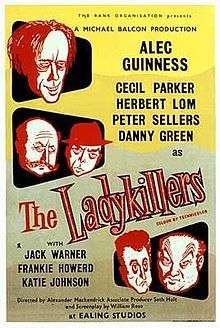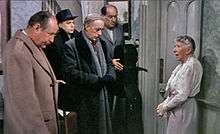The Ladykillers
| The Ladykillers | |
|---|---|
 Original film poster by Reginald Mount | |
| Directed by | Alexander Mackendrick |
| Produced by | Michael Balcon |
| Written by | William Rose |
| Starring | |
| Music by | Tristram Cary |
| Cinematography | Otto Heller |
| Edited by | Jack Harris |
Production company | |
| Distributed by | Rank Organisation (UK) |
Release dates |
|
Running time | 97 minutes |
| Country | United Kingdom |
| Language | English |
The Ladykillers is a 1955 British black comedy film made by Ealing Studios. Directed by Alexander Mackendrick, it stars Katie Johnson, Alec Guinness, Cecil Parker, Herbert Lom, Peter Sellers, Danny Green and Jack Warner.[1]
American William Rose wrote the screenplay,[1] for which he was nominated for an Academy Award for Writing Original Screenplay and won the BAFTA Award for Best British Screenplay. He claimed to have dreamt the entire film and merely had to remember the details when he awoke.
Plot summary
Mrs. Louisa Alexandra Wilberforce (Katie Johnson) is a sweet and eccentric old widow who lives alone with her raucous parrots in a gradually subsiding lopsided house, built over the entrance to a railway tunnel in Kings Cross, London. With nothing to occupy her time and an active imagination, she is a frequent visitor to the local police station where she reports fanciful suspicions regarding neighbourhood activities. Having led wild-goose chases in the past, she is humoured by the officers there who give her reports no credence whatever.
She is approached by an archly sinister character, 'Professor' Marcus (Alec Guinness), who wants to rent rooms in her house. She is not aware that he has assembled a gang of hardened criminals for a sophisticated security van robbery at London King's Cross railway station: the gentlemanly and easily fooled con-man Major Claude Courtney (Cecil Parker); the comedic Cockney spiv Harry Robinson (Peter Sellers); the slow-witted and punch drunk ex-boxer 'One-Round' Lawson (Danny Green); and the murderous, cruel and vicious continental gangster Louis Harvey (Herbert Lom). As a cover, the "Professor" convinces the naive Mrs. Wilberforce that the group is an amateur string quintet using the rooms for rehearsal space. To maintain the deception, the gang members carry musical instruments and play a recording of Boccherini's Minuet (3rd movement) from String Quintet in E, Op. 11 No. 5 during their planning sessions.
After the heist, "Mrs. W" is deceived into retrieving the disguised "lolly" from the railway station herself. This she successfully manages to do but not without serious complications owing to her tendency to righteous meddling. Now the real difficulties begin. As the gang departs her house with the loot, 'One-Round' accidentally gets his cello case full of banknotes trapped in the front door. As he pulls the case free, banknotes spill forth while Mrs. Wilberforce looks on. Finally, smelling a rat, she informs Marcus that she is going to the police.
Stalling, the gangsters half convince Mrs. W that she will surely be considered an accomplice for holding the lolly. In any case, it is a victimless crime as insurance will cover all the losses and the police will probably not even accept the money back. She wavers but when she rallies the criminals finally decide they must kill her. No one wants to do it so they draw lots using matchsticks. The Major loses but tries to make a run for it with the cash. As the oblivious Mrs. W dozes, the criminals cross, double-cross and manage to kill one another in rapid succession. The Major falls off the roof of the house after being chased by Louis; Harry is killed by One-Round who thinks Harry has killed Mrs. W after having a change of heart; One-Round tries to shoot Louis and Marcus when he overhears a plan to double-cross him but leaves the gun's safety catch on and is himself killed by Louis; Marcus kills Louis by dislodging his ladder under the tunnel behind the house causing Louis to fall into a passing railway wagon. Before falling into the carriage Louis fires a last shot at Marcus which nearly hits him. Finally with no one else left Marcus himself is struck on the head by a railway signal over the tunnel and drops into another wagon. All the other bodies have been dumped into railway wagons passing behind the house and are now far away.
Mrs. Wilberforce is now left alone with the plunder. She goes to the police to return it but they do not believe her story. They humour her, telling her to keep the money. She is puzzled but finally relents and returns home. Along the way, she leaves a banknote of enormous denomination with a startled "starving artist".
Cast

- Alec Guinness as Professor Marcus
- Katie Johnson as Mrs Louisa Wilberforce/Mrs. Lop-sided/Mrs. W.
- Herbert Lom as Louis Harvey
- Peter Sellers as Harry Robinson
- Danny Green as 'One-Round' Lawson
- Cecil Parker as Major Claude Courtney
- Jack Warner as the police superintendent
- Philip Stainton as the police sergeant
- Frankie Howerd as the barrow boy
The comedian Frankie Howerd has a small role as an agitated barrow boy, as does Kenneth Connor as a taxi driver. A young Stratford Johns (Charlie Barlow from Z-Cars) plays the driver of the security van that gets robbed.
Guinness based Professor Marcus on the actor Alastair Sim.[2] Sim's daughter has claimed in interviews that many assume that her father actually played the part.
Production
The film poster was by Reginald Mount.[3]
Awards and nominations
Wins
- BAFTA Award for Best Actress in a Leading Role - Katie Johnson
- BAFTA Award for Best British Screenplay - William Rose
Nominations
- Academy Award for Writing Original Screenplay - William Rose
- BAFTA Award for Best Film from any Source
- BAFTA Award for Best British Film
Poll
In 2000, readers of Total Film magazine voted The Ladykillers the 36th greatest comedy film of all time, and The Guardian labelled it the 5th greatest comedy of all time in 2010.
Film locations
Mrs. Wilberforce's house, No. 57, was a set built at the western end of Frederica Street, in Barnsbury, North London. In the 1970s a new housing estate was built in that area. The closest point to the location of Mrs. Wilberforce's house, is now at the southern end of Conistone Way. It was directly above the southern portal of Copenhagen Tunnel on the railway line leading out of King's Cross railway station. However, the views from her house are of Argyle Street, some distance away, with the tower of St Pancras railway station in the background. The scene of the security truck turning into King's Cross used the route from Goods Way, passing gas holders, turning left into Battle Bridge Road and right into Cheney Road. Goods Way was realigned northwards as a part of the Channel Tunnel Rail Link works and the gas holders were removed. A short length of Battle Bridge Road survives, but Cheney Road was largely removed to accommodate a realignment of Pancras Road that was originally to run to the east of the German Gymnasium, but now runs between St Pancras railway station and the German Gymnasium.
Reception
Box office
According to the National Film Finance Corporation, the film made a comfortable profit.[4]
Critical response
The Ladykillers currently holds a rare 100% rating on review aggregator website Rotten Tomatoes, based on 23 reviews.[5]
Adaptations
- In 1966 the film was adapted into an opera by the Czech composer Ilja Hurník under the name The Lady and the Robbers (Dáma a lupiči).
- A radio adaptation of the film, by Bruce Bedford, was first broadcast on BBC Radio 4 on 13 January 1996 starring Edward Petherbridge and Margot Boyd.[6]
- In 2004 the Coen Brothers directed an American remake of the film, starring Tom Hanks, Irma P. Hall, Marlon Wayans, J. K. Simmons, Tzi Ma and Ryan Hurst. The setting of the film is moved from London to Saucier, Mississippi, home of a riverboat casino.[7]
- In 2011 the film was adapted as a play by Graham Linehan. It premiered at the Liverpool Playhouse in November that year before transferring to the Gielgud Theatre in London.[8][9]
- A new adaptation of the film arrived to London Vaudeville Theatre[10] on their 2013 summer tour around the UK and Ireland.[11] A big part of the cast has been changed [12] for this new season.
See also
References
- 1 2 "The Ladykillers 1955". Turner Classic Movies. Atlanta: Turner Broadcasting System (Time Warner). Retrieved 11 July 2016.
- ↑ "screenonline.org.uk, part of the British Film Institure (BFI)". Screenonline.org.uk. Retrieved 1 November 2014.
- ↑ "Reginald Mount". The Art of War. The National Archives. Retrieved 7 January 2014.
- ↑ U.S. MONEY BEHIND 30% OF BRITISH FILMS: Problems for the Board of Trade: The Manchester Guardian, 4 May 1956. p. 7.
- ↑ . "The Ladykillers (1955): Rotten Tomatoes". Retrieved 28th November 2016.
- ↑ "BBC radio programmes catalogue entry". BBC. 26 November 2012. Retrieved 1 November 2014.
- ↑ "The Ladykillers 2004". Turner Classic Movies. Atlanta: Turner Broadcasting System (Time Warner). Retrieved 11 July 2016.
- ↑ Graham Linehan. "How Graham Linehan dynamited The Ladykillers". Guardian. Retrieved 1 November 2014.
- ↑ "Play details on Gielgud Theatre site". London-theatreland.co.uk. Retrieved 1 November 2014.
- ↑ "Vaudeville Theatre". Vaudeville Theatre. 9 October 2007. Retrieved 1 November 2014.
- ↑ "» Latest News". Theladykillers.co.uk. Retrieved 1 November 2014.
- ↑ "The Ladykillers Review - Best of Theatre News". Bestoftheatre.co.uk. 15 July 2013. Retrieved 1 November 2014.
External links
| Wikiquote has quotations related to: The Ladykillers |
- The Ladykillers at the Internet Movie Database
- The Ladykillers at Rotten Tomatoes
- The Ladykillers at AllMovie
- The Ladykillers at the TCM Movie Database
- Then and now photographs of locations
- Brief YouTube documentary on locations used in 'The Ladykillers'
- Locations used in 'The Ladykillers' at Reelstreets.com